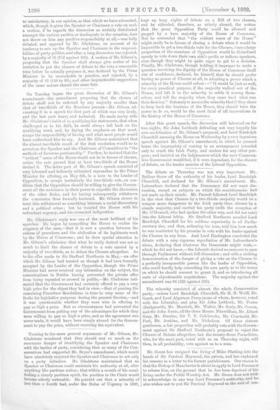Turning to the more general arguments of Mr. Gibson, Mr.
Gladstone wondered that they should rest so much on the enormous danger of identifying the Speaker and Chairman with the tactics of party, considering that so many of the Con- servatives had supported Mr. Bryce's amendment, which would have absolutely required the Speaker and Chairman to act only on a party initiative. Mr. Gladstone maintained that no Speaker or Chairman could maintain his authority at all, after anything like partisan action ; that within a month of his mani- festing a clearly partisan spirit, his position in the Chair would become utterly untenable. He pointed out that a minority of less than a fourth had, under the Rules of Urgency in 1881,
kept up long nights of debate on a Bill of two clauses,. and he ridiculed, therefore, as utterly absurd, the notion that the great Opposition Party could be silenced and gagged by a bare majority of the House of Commons. But he contended that "the evident sense of the House might easily be in favour of closing a debate when it would be impossible to get a two-thirds vote for the Closure, since a large proportion of the members of Opposition would be disinclined openly to vote down their own side's prolix or tedious Speakers,. even though they might be quite eager to get to a division. Finally, Mr. Gladstone, though holding it improper to make a question involving the dignity of the House of Commons itself one of confidence, declared, for himself, that he should prefer having no power of Closure at all, to adopting a power which a minority of the House could refuse :—" It would be just as well, for every practical purpose, if the majority walked out of the House, and left it to the minority to settle it among them- selves, and tell the majority when they came back what was their decision." Solemnly to assure the minority that if they chose to keep back the business of the House, they should have the power to do so, would be the most fatal of all innovations in the history of the House of Commons.


































 Previous page
Previous page